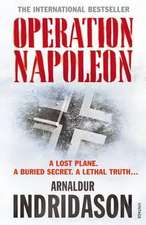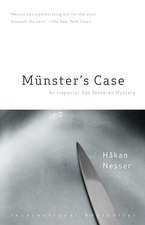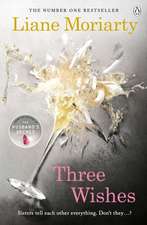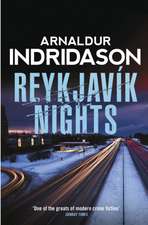The Mind's Eye: The Van Veeteren series
Autor Hakan Nesser Traducere de Laurie Thompsonen Limba Engleză Paperback – mai 2009
| Toate formatele și edițiile | Preț | Express |
|---|---|---|
| Paperback (2) | 58.28 lei 3-5 săpt. | +12.27 lei 4-10 zile |
| Pan Macmillan – mai 2009 | 58.28 lei 3-5 săpt. | +12.27 lei 4-10 zile |
| Vintage Crime/Black Lizard – 31 mai 2009 | 110.88 lei 3-5 săpt. |
Preț: 58.28 lei
Nou
Puncte Express: 87
Preț estimativ în valută:
11.15€ • 11.60$ • 9.21£
11.15€ • 11.60$ • 9.21£
Carte disponibilă
Livrare economică 25 martie-08 aprilie
Livrare express 08-14 martie pentru 22.26 lei
Preluare comenzi: 021 569.72.76
Specificații
ISBN-13: 9780330492782
ISBN-10: 0330492780
Pagini: 416
Dimensiuni: 131 x 201 x 30 mm
Greutate: 0.3 kg
Editura: Pan Macmillan
Seria The Van Veeteren series
Locul publicării:United Kingdom
ISBN-10: 0330492780
Pagini: 416
Dimensiuni: 131 x 201 x 30 mm
Greutate: 0.3 kg
Editura: Pan Macmillan
Seria The Van Veeteren series
Locul publicării:United Kingdom
Notă biografică
Håkan Nesser was born in 1950 in Sweden. In 1993 he was awarded the Swedish Crime Writers' Academy Prize for new authors for his novel Mind's Eye, and is the only author to have won the Academy's best novel award three times: in 1994 for Borkmann's Point; in 1996 for Woman with Birthmark; and in 2007 for A Rather Different Story. In 1999 he was awarded the Crime Writers of Scandinavia's Glass Key Award for the best crime novel of the year for Carambole. His novels have been published to wide acclaim in twenty-five countries.
Extras
He woke up and was unable to remember his name.
His pains were legion. Shafts of fire whirled around in his head and throat, his stomach and chest. He tried to swallow, but it remained an attempt. His tongue was glued to his palate. Burning, smoldering.
His eyes were throbbing. Threatening to grow out of their sockets.
It’s like being born, he thought. I’m not a person. Merely a mass of suffering.
The room was in darkness. He groped around with his free hand, the one that was not numb and tingling underneath him.
Yes, there was a bedside table. A telephone and a glass. A newspaper. An alarm clock.
He picked it up, but halfway it slipped through his fingers and fell onto the floor. He fumbled around, took hold of it again, and held it up, close to his face.
The hands were slightly luminous. He recognized them.
Twenty past eight. Presumably in the morning.
He still had no idea who he was.
...
He didn’t think this had happened before. He had certainly woken up and not known where he was. Or what day it was. But his name . . . had he ever forgotten his name?
John? Janos?
No, but something like that.
It was there, somewhere in the background, not only his name but everything. . . . Life and lifestyle and extenuating circumstances. Lying there waiting for him. Behind a thin membrane that would have to be pierced, something that had not woken up yet. But he was not really worried. He would know soon enough.
Perhaps it was not something to look forward to.
The pain behind his eyes suddenly got worse. Possibly the strain of thinking had caused it; but it was there, whatever. White hot and excruciating. A scream of flesh.
Nothing else mattered.
The kitchen was to the left and seemed familiar. He found the pills without difficulty; he was becoming increasingly sure that this was his home. No doubt everything would become clear at any moment.
He went back into the hall. Kicked against a bottle standing in the shadow cast by a bookcase. It rolled away over the parquet floor and ended up under the radiator. He shuffled to the bathroom. Pressed down the handle.
It was locked.
He leaned awkwardly forward. Put his hands on his knees to support himself, and checked the indicator on the door.
Red. As he’d thought. It was occupied.
He could feel the bile rising.
“Open . . .” he tried to shout, but could produce no more than a croak. He leaned his forehead against the cool wood of the door.
“Open up!” he tried again, and this time managed to produce the right sounds, almost. To stress the seriousness of his situation he belted several times with his clenched fists.
No response. Not a sound. Whoever was in there obviously had no intention of letting him in.
There was a sudden surge from his stomach. Or pos- sibly from even lower down . . . It was obviously a matter of seconds now. He staggered back along the hall. Into the kitchen.
This time it seemed more familiar than ever.
This is definitely my home, he thought as he vomited into the sink.
With the aid of a screwdriver he succeeded in unlocking the bathroom door. He had a distinct feeling that it was not the first time he’d done this.
“I’m sorry, but I really had to . . .”
He entered the room and just as he switched on the light, he became quite clear about who he was.
He could also identify the woman lying in the bathtub.
Her name was Eva Ringmar and she was his wife of three months.
Her body was strangely twisted. Her right arm hung over the edge at an unnatural angle. The well-manicured fingernails reached right down to the floor. Her dark hair was floating on the water. Her head was facedown, and as the tub was full to the brim, there could be no doubt that she was dead.
His own name was Mitter. Janek Mattias Mitter. A teacher of history and philosophy at the Bunge High School in Maardam.
Known informally as J.M.
After these insights he vomited again, this time into the lavatory. Whereupon he took two more tablets out of the bottle and telephoned the police.
From the Hardcover edition.
His pains were legion. Shafts of fire whirled around in his head and throat, his stomach and chest. He tried to swallow, but it remained an attempt. His tongue was glued to his palate. Burning, smoldering.
His eyes were throbbing. Threatening to grow out of their sockets.
It’s like being born, he thought. I’m not a person. Merely a mass of suffering.
The room was in darkness. He groped around with his free hand, the one that was not numb and tingling underneath him.
Yes, there was a bedside table. A telephone and a glass. A newspaper. An alarm clock.
He picked it up, but halfway it slipped through his fingers and fell onto the floor. He fumbled around, took hold of it again, and held it up, close to his face.
The hands were slightly luminous. He recognized them.
Twenty past eight. Presumably in the morning.
He still had no idea who he was.
...
He didn’t think this had happened before. He had certainly woken up and not known where he was. Or what day it was. But his name . . . had he ever forgotten his name?
John? Janos?
No, but something like that.
It was there, somewhere in the background, not only his name but everything. . . . Life and lifestyle and extenuating circumstances. Lying there waiting for him. Behind a thin membrane that would have to be pierced, something that had not woken up yet. But he was not really worried. He would know soon enough.
Perhaps it was not something to look forward to.
The pain behind his eyes suddenly got worse. Possibly the strain of thinking had caused it; but it was there, whatever. White hot and excruciating. A scream of flesh.
Nothing else mattered.
The kitchen was to the left and seemed familiar. He found the pills without difficulty; he was becoming increasingly sure that this was his home. No doubt everything would become clear at any moment.
He went back into the hall. Kicked against a bottle standing in the shadow cast by a bookcase. It rolled away over the parquet floor and ended up under the radiator. He shuffled to the bathroom. Pressed down the handle.
It was locked.
He leaned awkwardly forward. Put his hands on his knees to support himself, and checked the indicator on the door.
Red. As he’d thought. It was occupied.
He could feel the bile rising.
“Open . . .” he tried to shout, but could produce no more than a croak. He leaned his forehead against the cool wood of the door.
“Open up!” he tried again, and this time managed to produce the right sounds, almost. To stress the seriousness of his situation he belted several times with his clenched fists.
No response. Not a sound. Whoever was in there obviously had no intention of letting him in.
There was a sudden surge from his stomach. Or pos- sibly from even lower down . . . It was obviously a matter of seconds now. He staggered back along the hall. Into the kitchen.
This time it seemed more familiar than ever.
This is definitely my home, he thought as he vomited into the sink.
With the aid of a screwdriver he succeeded in unlocking the bathroom door. He had a distinct feeling that it was not the first time he’d done this.
“I’m sorry, but I really had to . . .”
He entered the room and just as he switched on the light, he became quite clear about who he was.
He could also identify the woman lying in the bathtub.
Her name was Eva Ringmar and she was his wife of three months.
Her body was strangely twisted. Her right arm hung over the edge at an unnatural angle. The well-manicured fingernails reached right down to the floor. Her dark hair was floating on the water. Her head was facedown, and as the tub was full to the brim, there could be no doubt that she was dead.
His own name was Mitter. Janek Mattias Mitter. A teacher of history and philosophy at the Bunge High School in Maardam.
Known informally as J.M.
After these insights he vomited again, this time into the lavatory. Whereupon he took two more tablets out of the bottle and telephoned the police.
From the Hardcover edition.
Recenzii
“Lean, atmospheric and full of existential uncertainty. . . . Nesser isn't interested in life's pretty offerings. His detectives expect the worst because they have seen the world go wrong too often.” —Richmond Times-Dispatch
“Snappish, sardonic, unsentimental, depressed, and quite possibly psychic, Van Veeteren is the most appealingly unlovable hero since TV's crabby physician House.” —O, The Oprah Magazine
“In a class of its own. . . . This stunning novel by one of Sweden's foremost crime writers might have been written as a script for Alfred Hitchcock.” —The Sunday Times (London)
“Mind's Eye satisfies on every level. It is an intelligently written, cleverly plotted tale, populated with believable characters. . . . Nesser was superb right out of the gate.” —BookPage
“Snappish, sardonic, unsentimental, depressed, and quite possibly psychic, Van Veeteren is the most appealingly unlovable hero since TV's crabby physician House.” —O, The Oprah Magazine
“In a class of its own. . . . This stunning novel by one of Sweden's foremost crime writers might have been written as a script for Alfred Hitchcock.” —The Sunday Times (London)
“Mind's Eye satisfies on every level. It is an intelligently written, cleverly plotted tale, populated with believable characters. . . . Nesser was superb right out of the gate.” —BookPage






















